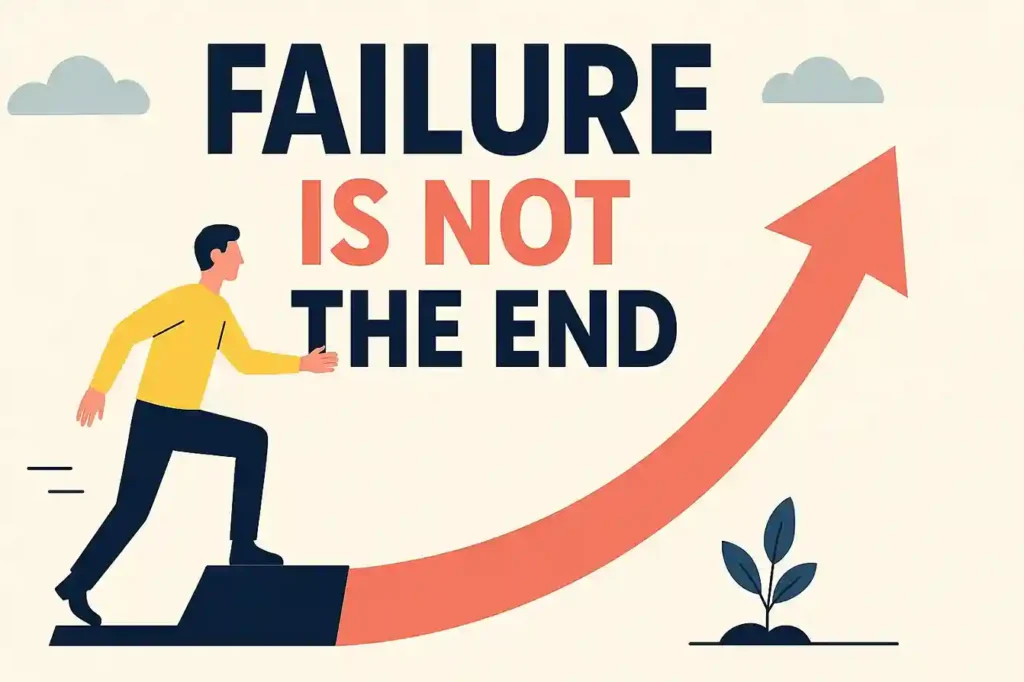Failure Is Not the End: Lessons from Setbacks That Build Success

Failure is a word that most people fear, but in truth, it is one of life’s greatest teachers. Whether it’s a student struggling in exams, a professional facing career setbacks, or an entrepreneur watching ideas collapse, one truth always remains: Failure Is Not the End. Instead, it is a turning point that shapes our character, strengthens our willpower, and prepares us for greater success.
From inspiring Indian icons like Dr. A.P.J. Abdul Kalam, Amitabh Bachchan, and Dhirubhai Ambani to global personalities such as Thomas Edison, Walt Disney, and J.K. Rowling—every success story has failure at its roots. The key is to accept failure, learn from it, and keep moving forward without fear.
This article explores why failure should not be seen as defeat, how to embrace it with courage, and the powerful life lessons it brings. If you’ve ever felt stuck after a setback, remember: failure is not a stop sign, it is simply a redirection towards something greater.
Introduction: The Hidden Power of Failure
Almost every one of us has faced moments where we felt broken, a failed exam, a lost job, a rejected business idea, or even a personal dream that didn’t work out. In those moments, failure feels like the end of the road. But let us pause for a moment and reflect: is it really the end? Or is it just the beginning of something greater?
The truth is, Failure Is Not the End. Instead, it is a stepping stone that teaches us lessons no book, no mentor, and no success can ever teach. Success feels good, but failure makes us strong, humble, and wise. In fact, every great personality—from leaders and scientists to entrepreneurs and artists—has walked through the door of failure before reaching success.
In Indian families, failure is often seen with shame, but in reality, it is a powerful teacher. Globally, too, stories of innovators, freedom fighters, and visionaries prove the same point: Failure Is Not the End, but a redirection to something better.
Let us explore how failure changes lives, why it is misunderstood, and how we can turn it into a lifelong advantage.
Why Do We Fear Failure So Much?
Failure feels painful because it touches our deepest emotions. It brings self-doubt, fear of judgment, and sometimes even rejection from society. Especially in India, where marks, degrees, and job titles are often seen as measures of worth, failure can seem unbearable.
But if we think carefully, failure is not a label for life. It is just feedback for one attempt. The real danger is not in failing, but in believing that failure defines us. Once we change this perspective, we realize that Failure Is Not the End, but an opportunity to grow stronger.
The CEO’s Wisdom: Failure Teaches as Much as Success
I remember a powerful thought shared by the CEO of our company. He said:
“We never lose everything. If we succeed, it’s good. But if we fail, we still learn many things from our failure. That is why Failure Is Not the End.”
This wisdom reflects a truth that applies to everyone. Students, employees, business leaders, and even homemakers. Every failed attempt leaves behind hidden lessons that prepare us for bigger achievements.
Real-Life Examples: Indians Who Proved Failure Is Not the End
1. Dr. A.P.J. Abdul Kalam
Known as the “Missile Man of India,” Dr. Kalam faced multiple failures in his early projects at ISRO. In fact, one of the satellite projects he led initially failed. But instead of giving up, he used the lessons to lead India to global recognition in space and defense. His journey shows us that Failure Is Not the End, but a bridge to greatness.
2. Mahatma Gandhi
Before becoming the Father of the Nation, Gandhi faced failures in his law practice. In South Africa, he was even thrown out of a train for protesting against discrimination. But those setbacks shaped his character and fueled his fight for freedom. Without those failures, India’s independence story might have been different.
3. Amitabh Bachchan
Today, he is Bollywood’s “Shahenshah,” but in the early 70s, Amitabh Bachchan was rejected multiple times because of his deep voice and tall figure. His movies even flopped at the beginning. Yet, he kept going, proving that Failure Is Not the End of talent.
4. Dhirubhai Ambani
Coming from a modest background, Dhirubhai Ambani started small and faced several business setbacks. But with vision and persistence, he went on to build Reliance, one of India’s largest companies. His life reminds us that Failure Is Not the End of dreams.
Global Personalities Who Turned Failure into Success
- Thomas Edison: He failed thousands of times before inventing the light bulb. His failures were experiments that lit up the world.
- Albert Einstein: Called “slow” by his teachers, Einstein’s struggles in school did not stop him from becoming one of the greatest scientists.
- Walt Disney: Fired from a newspaper for “lack of creativity,” he went on to create Disneyland and the Disney empire.
- J.K. Rowling: Rejected by 12 publishers before Harry Potter became a global phenomenon.
- Michael Jordan: The legendary basketball player was cut from his high school team. He later said, “I’ve failed over and over again in my life, and that is why I succeed.”
All of them proved that Failure Is Not the End, but the path to extraordinary success.
The Psychology of Failure: What It Teaches Us
- Resilience: Each failure builds emotional strength to stand again.
- Humility: It reminds us that no one is perfect.
- Innovation: Failure pushes us to think creatively.
- Clarity: It tells us what does not work, saving future time.
- Courage: Facing failure makes us fearless in future attempts.
When looked at this way, failure is not an enemy but a silent coach.
Myths About Failure That We Must Break
- Myth 1: Failure means weakness
In reality, it means courage to try. Only those who dare can fail. - Myth 2: Failure destroys reputation
History remembers fighters, not those who never tried. - Myth 3: Failure wastes time
Every failure reduces future mistakes, which is a hidden saving. - Myth 4: Failure happens only to unlucky people
Every successful person has failed many times. Luck alone never creates greatness.
How to Embrace Failure in Everyday Life
1. Accept It Gracefully
Don’t hide from failure. Accepting it openly reduces shame.
2. Reflect on Lessons
Write down what went wrong and what can be improved.
3. Adjust Your Strategy
Try a new method instead of repeating the same mistake.
4. Seek Support
Talk to mentors, teachers, or friends who can guide you.
5. Keep Moving Forward
Never let one failure freeze your journey. Small steps eventually create big success.
This mindset ensures that Failure Is Not the End, but just one chapter in your story.
Why Failure Is Essential for Success
Without failure, success would be incomplete. Imagine a student who always scores full marks without trying — would that success have meaning? Similarly, entrepreneurs who never fail cannot truly innovate. Failure tests our patience, builds wisdom, and makes victory sweeter.
As the Indian saying goes, “Saphalta ka asli maza tabhi hai, jab aapne asafalta ka samna kiya ho.” (The real taste of success comes only after facing failure.)
Conclusion: Failure Is Not the End
Life is never a smooth, straight path; it is a journey filled with challenges, setbacks, lessons, and victories. Both success and failure are temporary phases that shape who we become. What truly defines a person is not how many times they fall, but how many times they rise again with renewed determination.
So, the next time you encounter defeat or disappointment, remember this truth: failure is not the end. It is simply life’s way of redirecting you toward something greater, stronger, and more meaningful. Every setback carries within it the seeds of growth, learning, and future success.
Embrace your failures as stepping stones to success, not roadblocks. Keep faith in yourself, stay resilient, and continue moving forward. Let each failure refine your strength, fuel your passion, and become the solid foundation on which your ultimate success story is built.
FAQs
Why do people say “Failure Is Not the End”?
Because failure is temporary. It teaches lessons that prepare us for future success.
How can students overcome exam failure?
By analyzing mistakes, seeking guidance, and preparing better for the next attempt, without losing confidence.
Can failure actually lead to success?
Yes, almost every success story includes failures. They provide clarity and motivation to improve.
Who are some famous Indians who proved this truth?
Dr. A.P.J. Abdul Kalam, Mahatma Gandhi, Amitabh Bachchan, and Dhirubhai Ambani.
How should we deal with failure emotionally?
Accept it calmly, talk to supportive people, and focus on the lessons rather than the loss.
